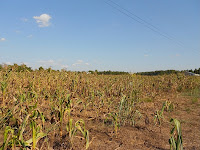Drought-stressed corn (Image: CraneStation/Flickr)
As severe drought conditions destroy record numbers of crops and endanger yet more across the United States, farmers are understandably reassessing the bill of goods they were sold by multinational Big Biotech companies who pushed GMO (genetically modified) seeds, always promising greater yields, no matter what conditions were, no matter what was sprayed on them. The truth about those products, as usual, turns out to be much more complicated than the superficial claims dreamed up by advertising copywriters.
We're reminded of a television ad from the 1970's in which a tiara-wearing fairy goddess scolds people who've just given her a muffin slathered with margarine that she is supposed to have mistaken for real butter:
It's not NICE to fool Mother Nature!
No, it isn't. Fooling Mother Nature is also a feat that, in the long run, is pretty much impossible to pull off--something Big Ag and Big Biotech companies would do well to realize.
From Wired's Science section comes this sobering post, entitled Why King Corn Wasn't Ready for the Drought. Apparently, even as GMO seeds--ones designed to tolerate, say, massive applications of weedkiller or pesticide--wind up causing unintended consequences (you guessed it: they're breeding Super-Weeds and Super-Bugs), biotech companies are still trying to fool Mother Nature, creating seeds they claim will handle drought. The benefits will be limited, however, and one agricultural economist says it's because Big Biotech has not, to date, viewed drought-tolerance as a moneymaking thing into which to pour research dollars:
If they work as advertised, the varieties could be quite useful in droughts of low to moderate intensity. Their utility in the crucible that much of the central and western United States is expected to become, however, will likely be limited.
It’s a far cry from traits like Bt pesticide production and Roundup herbicide tolerance. Those are powerful and ubiquitous, the agricultural analogues of blockbuster drugs, and have dominated company research efforts. “They are incredibly large products, and that’s why the companies have emphasized them,” said agricultural economist Greg Graff of Colorado State University.
Given the costs of developing new products, agriculture companies, just like drug companies, focus on those with the biggest payoffs. As for drought tolerance, said Graff, “We haven’t been trying that hard for that long.”As you know, 3 Boys Farm is a largely hydroponic facility--we are, by definition, water-users.
But--and this is important--we never try to fool Mother Nature. We much prefer listening to her, learning from her, and working alongside her.
Which is why we grow from organic, heirloom seeds. And rather than ask "What manipulations can we make to the DNA of a plant in order to make it tolerate low-water conditions?" we instead think:
What can we do to ensure the water we DO get from our environment is put to its highest use?
Can we significantly reduce the amount of water we drain from the earth by capturing it from the sky, and saving it?
How can we prevent wasting water?For answers to those questions, take a peek at the video at the top of the sidebar.-->
The solution to growing food in dry conditions does not lie within lab-altered seeds, especially given that such seeds then become the patented properties of corporate interests, ones that don't always align with human interests.
The solution to growing food for a growing world is to maximize yields within available resource limits. And you do this by combining simple, time-tested conservation methods (like rainwater catchment) with modern materials, such as light-filtering fabrics and solar-powered cooling systems.
Just as we've been doing at 3 Boys Farm.

